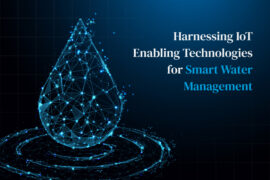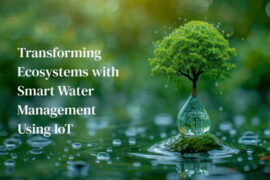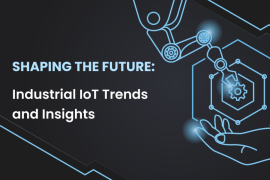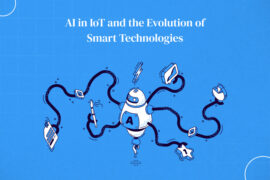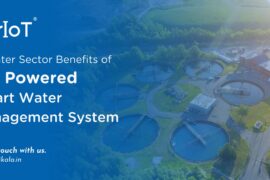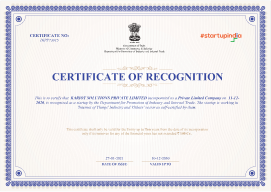Smart irrigation system using IoT have revolutionized agriculture offering unprecedented control and efficiency. These systems utilize Internet of Things (IoT) technology to enhance traditional irrigation methods providing real time data and automation for optimized water usage.
In an era where water scarcity is a growing concern, smart irrigation system using IoT play a pivotal role in water conservation. By leveraging IoT in agriculture these systems enable farmers to monitor soil moisture levels and weather conditions ensuring water is used efficiently.
Smart irrigation is the integration of IoT devices in traditional irrigation systems, offering farmers precise control over watering processes. This article explores the multiple benefits, components, challenges and future trends associated with smart irrigation system.
Understanding IoT in Agriculture:

Definition and Role of IoT
The Internet of Things (IoT) is a network of interconnected physical devices such as vehicles, appliances and other objects that are embedded with sensors, software and network connectivity, enabling them to collect and exchange data. Essentially IoT allows these “things” to communicate and interact with each other over the internet.
IoT applications in various industries
IoT has a wide range of applications across various industries, including healthcare, agriculture, transportation, smart homes and industrial settings. It enhances efficiency, automation and decision-making processes by harnessing the power of data generated by connected devices.
Specifics of IoT in agriculture
Through precision farming, IoT devices like sensors and drones collect real-time data on soil conditions, moisture levels and crop health, empowering farmers to optimize decisions on irrigation, fertilization and pest control. By integrating IoT technologies into agriculture, farmers can improve resource efficiency, reduce environmental impact and enhance overall productivity.
How does a Smart Irrigation System using IoT work?

A Smart Irrigation System using IoT (Internet of Things) incorporates sensors, connectivity and data analytics to optimize the irrigation process. Here is a summary of how it functions.
Soil Moisture Sensors:
- The system utilizes soil moisture sensors placed in the soil at different locations within the irrigation area.
- These sensors measure the moisture content in the soil, providing real-time data about the soil’s water saturation levels.
Weather Stations:
- Weather stations collect data about environmental conditions such as temperature, humidity, wind speed and precipitation.
- This information is crucial for understanding the atmospheric conditions that may affect plant water requirements.
Connectivity:
- The sensors and weather stations are connected to a central control unit or a gateway device using wireless communication protocols (e.g., Wi-Fi, Bluetooth, or Zigbee).
- The central control unit acts as a bridge between the sensors, weather stations and the IoT platform.
IoT Platform:
- The data collected from soil moisture sensors and weather stations are transmitted to an IoT platform or cloud-based system.
- The IoT platform processes and analyzes the data, considering factors such as soil type, plant type and weather conditions.
Decision Making Algorithm:
- The IoT platform uses intelligent algorithms to make decisions about when and how much to irrigate based on the analyzed data.
- Factors like current soil moisture levels, weather forecasts and plant water requirements are taken into account.
Actuators and Control Devices:
- Based on the decisions made by the IoT platform, control signals are sent to actuators that manage the irrigation system.
- Actuators control valves, pumps and other devices to adjust the flow of water to specific zones or plants.
Self Operating Irrigation:
- The irrigation system is self-operating and water is supplied precisely when and where it is needed.
- This self-operating system reduces water wastage, promotes efficient water use and ensures that plants receive the optimal amount of water for their growth.
User Interface and Monitoring:
- Users can monitor and control the smart irrigation system through a user interface, which can be a web application, mobile app or a dedicated control panel.
- The interface provides real-time information on soil moisture levels, weather conditions and irrigation activities.
Need for Smart Irrigation System using IoT:

In today’s world where sustainability is crucial, the need for efficient water management is more evident than ever. Traditional irrigation methods often lead to water wastage, inefficiency and manual monitoring challenges.
But Smart Irrigation System using IoT explores the transformative impact of Irrigation Systems, highlighting their working mechanisms, environmental benefits, cost efficiency and applications in agriculture.
Water Waste: Conventional irrigation methods often result in overwatering, leading to unnecessary water waste. Smart systems address this issue by providing real-time data on soil moisture, preventing excessive irrigation.
Inefficient Water Distribution: Uneven water distribution is a common problem in traditional systems. Smart Irrigation employs technology to ensure that water reaches every part of the field or garden evenly, promoting optimal plant growth.
Soil Erosion: Certain traditional methods like flood irrigation can contribute to soil erosion. Excessive water flow can wash away fertile topsoil, leading to long term degradation of agricultural land. Smart irrigation system can contribute to the reduction of soil erosion through improved water management practices.
Manual Monitoring: Monitoring irrigation manually can be time consuming and prone to errors. Smart systems automate this process, allowing users to remotely monitor and control irrigation schedules reducing the burden on farmers and gardeners.
Elements of a Smart Irrigation System Using IoT:
Soil humidity sensors
By measuring soil humidity levels and integrating with smart systems, these sensors enable precise, customized watering schedules. Proper placement at varying depths ensures accurate data representation, preventing overwatering and contributing to water conservation. Their compatibility with smart features allows for proactive responses to changing conditions, making soil humidity sensors indispensable for sustainable and resource efficient irrigation.
Weather forecasting integration
In modern agriculture, weather forecasting integration is a game changer for smart irrigation. This feature leverages real time weather data, adjusting irrigation schedules based on predictions. It enhances water conservation, automatically adapting to weather conditions and minimizing overwatering risks. With remote monitoring and control, users can make real-time adjustments, promoting a responsive and efficient irrigation approach.
Automated irrigation controllers
Automated irrigation controllers are pivotal in smart systems, ensuring precise water distribution and sophistication in irrigation practices. They allow users to customize watering schedules for optimal plant growth, integrating seamlessly with sensors to make real-time adjustments based on soil conditions and weather forecasts.
Considerations for Farmers:
Return on investment
In the adoption of smart irrigation system using IoT, farmers must prioritize the return on investment (ROI). The potential for water and resource savings, improved crop quality and enhanced operational efficiency, coupled with long term sustainability benefits underscores the importance of balancing costs for a financially and environmentally sustainable future.
Training and support
Farmers who use IoT driven smart irrigation systems need to be trained and assisted to ensure safety and efficiency. This includes comprehensive training programs, reliable technical support, user-friendly interfaces, continuous education and community engagement. Ensuring a seamless transition and optimal system utilization, these considerations are pivotal for farmers integrating IoT technology into their agricultural practices.
Customization for different crops
Customizing irrigation for different crops in IoT driven systems is crucial for farmers. This flexibility allows tailored watering schedules based on specific crop needs, optimizing moisture levels and promoting healthier plants. Utilizing data from IoT sensors enables informed decisions, fostering proactive responses to changing conditions for improved crop health and productivity.
Advantages of Smart Irrigation System Using IoT

Cost Savings: By using data from sensors and weather forecasts, farmers can optimize irrigation schedules and resource usage. This results in cost savings by reducing water and energy consumption, as well as minimizing the need for fertilizers and other inputs.
Water Conservation: IoT enabled sensors and actuators allow farmers to precisely control the amount of water delivered to crops based on real time data, such as soil moisture levels and weather conditions.
Energy Efficiency: Smart irrigation systems can be automated to respond to environmental conditions. This reduces the need for manual intervention and ensures that irrigation activities are synchronized with the specific requirements of the crops.
Remote Monitoring: IoT devices enable farmers to monitor the irrigation system remotely in real-time. This allows for quick detection and response to issues such as leaks or equipment malfunctions, minimizing downtime and preventing potential crop damage.
Improved Crop Yield and Quality: Smart irrigation system ensure that crops receive the right amount of water at the right time. This optimized irrigation leads to improved crop yield, quality and uniformity, ultimately enhancing the overall productivity of the farm.
Environmental Sustainability: By minimizing water wastage and using resources more efficiently, smart irrigation contributes to environmental sustainability. This is particularly important in regions facing water scarcity and where agriculture is a major consumer of water resources.
Integration with Other Technologies: Smart irrigation systems can be integrated with other agricultural technologies, such as precision farming tools and automation systems. This integration enhances overall farm management and creates a more connected and efficient agricultural ecosystem.
Challenges and Limitations of Smart Irrigation System Using IoT
Dependency on Connectivity: Smart irrigation systems rely heavily on stable and continuous internet connectivity. In areas with poor network coverage or frequent outages. The effectiveness of these systems can be compromised. Leading to delayed or inaccurate data transmission.
Training Requirement for Farmers: Farmers and agricultural workers may lack the technical expertise required to set up, configure and troubleshoot IoT based irrigation systems. Training programs and ongoing technical support are essential for successful implementation.
Scalability Challenges: Adapting smart irrigation systems to various agricultural contexts and scales can be challenging. The diversity of crops, soil types and climate conditions requires customizable solutions and scalability may pose logistical and technological challenges.
Maintenance and Upkeep: Regular maintenance is essential for the proper functioning of IoT devices. Sensors may degrade over time and software updates. So they required to address emerging issues or improve system efficiency.
Future Trends in Smart Irrigation System Using IoT:

Technological advancements
The future of smart irrigation systems using IoT is marked by exciting technological advancements. This includes dynamic adjustments, enhanced sensor technologies offering comprehensive data, cloud based solutions for scalability, precision water delivery at the individual plant level and more sophisticated automated decision making processes. These innovations promise a future where agricultural practices are more intelligent, sustainable and efficient in water management.
Integration with AI and machine learning
The integration of AI and machine learning in future smart irrigation systems promises a transformative shift. These technologies will conduct intelligent data analysis, enabling precise irrigation decisions based on soil conditions, weather patterns and crop requirements. Adaptive irrigation strategies, predictive maintenance, resource optimization and enhanced decision making capabilities highlight the potential for increased efficiency and sustainability in water management practices for agriculture and landscaping.
Global adoption trends
Globally, smart irrigation systems using IoT are experiencing significant trends. In agriculture, there’s a widespread adoption recognizing the benefits of efficient water management across diverse crops. Urban landscaping is also embracing IoT to optimize water usage in parks and public spaces.
Governments worldwide are fostering adoption through incentives and precision agriculture practices are influencing the integration of smart irrigation systems for enhanced crop yield and resource optimization. Notably, industry collaborations are accelerating innovation and contributing to widespread global adoption, reflecting a collective push towards sustainable and technologically advanced irrigation practices.

Conclusion:
In conclusion, embracing the power of IoT in the realm of smart irrigation systems has the potential to revolutionize how we manage water resources. As we navigate the challenges of water scarcity and the increasing demand for efficient irrigation, it becomes evident that the synergy of IoT and smart water management is not just a luxury but a necessity.
We are committed to being at the forefront of this transformative wave. Our innovative solutions not only contribute to water conservation but also empower farmers and businesses to make informed decisions.
So whether you’re a farmer looking to optimize your crop yield or a business aiming to contribute to sustainable practices, KarIoT is here to be your partner in smart water management. Contact us today to embark on a journey towards sustainable and efficient smart irrigation solutions.


